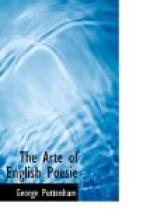the moe became mighty and famous in the world, soueraignetie
and dominion hauing learned them all maner of lusts
and licentiousnes of life, by which occasions also
their high estates and felicities fell many times into
most lowe and lamentable fortunes: whereas before
in their great prosperities they were both feared
and reuerenced in the highest degree, after their deathes
when the posteritie stood no more in dread of them,
their infamous life and tyrannies were layd open to
all the world, their wickednes reproched, their follies
and extreme insolencies derided, and their miserable
ends painted out in playes and pageants, to shew the
mutabilitie of fortune, and the iust punishment of
God in reuenge of a vicious and euill life. These
matters were also handled by the Poets and represented
by action as that of the Comedies: but
because the matter was higher then that of the Comedies
the Poets stile was also higher and more loftie, the
prouision greater, the place more magnificent:
for which purpose also the players garments were made
more rich & costly and solemne, and euery other thing
apperteining, according to that rate: So as where
the Satyre was pronounced by rusticall and
naked Syluanes speaking out of a bush, & the
common players of interludes called Plampedes,
played barefoote vpon the floore: the later Comedies
vpon scaffolds, and by men well and cleanely hosed
and shod. These matters of great Princes were
played vpon lofty stages, & the actors thereof ware
vpon their legges buskins of leather called Cothurni,
and other solemne habits, & for a speciall preheminence
did walke vpon those high corked shoes or pantofles,
which now they call in Spaine & Italy Shoppini.
And because those buskins and high shoes were commonly
made of goats skinnes very finely tanned, and dyed
into colours: or for that as some say the best
players reward, was a goate to be giuen him, or for
that as other thinke, a goate was the peculiar sacrifice
to the god Pan, king of all the gods of the
woodes: forasmuch as a goate in Greeke is called
Tragos, therfore these stately playes were
called Tragedies. And thus haue ye foure
sundry formes of Poesie Dramatick reprehensiue,
& put in execution by the feate & dexteritie of mans
body, to wit, the Satyre, old Comedie,
new Comedie, and Tragedie, whereas all
other kinde of poems except Eglogue whereof
shalbe entreated hereafter, were onely recited by mouth
or song with the voyce to some melodious instrument.
CHAP. XVI.
In what forme of Poesie the great Princes and dominators of the world were honored.




